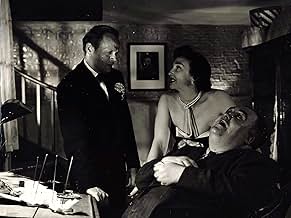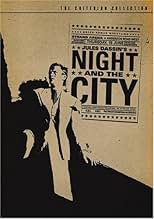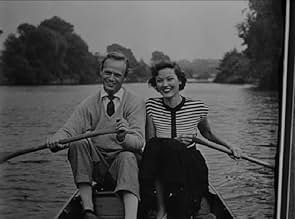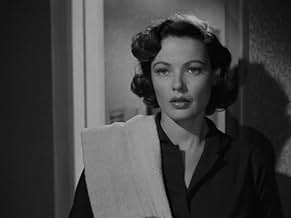IMDb RATING
7.8/10
16K
YOUR RATING
A small-time grifter and nightclub tout takes advantage of some fortuitous circumstances and tries to become a big-time player as a wrestling promoter.A small-time grifter and nightclub tout takes advantage of some fortuitous circumstances and tries to become a big-time player as a wrestling promoter.A small-time grifter and nightclub tout takes advantage of some fortuitous circumstances and tries to become a big-time player as a wrestling promoter.
Ken Richmond
- Nikolas of Athens
- (as Ken. Richmond)
Paul Beradi
- Diner
- (uncredited)
Derek Blomfield
- Young Policeman
- (uncredited)
Clifford Buckton
- Policeman
- (uncredited)
Ernest Butcher
- Bert
- (uncredited)
Peter Butterworth
- Thug
- (uncredited)
Naomi Chance
- Nightclub Hostess
- (uncredited)
Edward Chapman
- Hoskins
- (uncredited)
Featured reviews
My favorite Richard Widmark performance on the screen and probably his best work is Night and the City. This was director Jules Dassin's last film before settling in Europe in the wake of the blacklist and it has a first rate cast tuned to a fine pitch, like an orchestra without a bad note in it.
Harry Fabian is this smalltime American hustler/conman who's settled in London and always working that middle ground netherworld between the law and outright gangsterism. He really isn't a very likable man and the trick is to keep the audience care what's happening to him. This is the test of a great actor and Widmark is fully up to the challenge.
Fabian while working one of his cons overhears a piece of information about the father/son relationship between champion Graeco-Roman wrestler Gregorius the Great and gangster/promoter Cristo who is the London version of Vince McMahon. He cons Gregorius into thinking he wants to promote old style wrestling like Gregorius used to do. That con game sets in motion the events of the film that ultimately end in tragedy.
The cast is uniformly fine, but one performance really stands out, that of Stanislaus Zbyzsko as Gregorius. He was a real professional wrestling champion back in the day when it was real. Zbyzsko invests so much of his own life and reality as Gregorius that he's really something special. His scenes with Herbert Lom as his son are so good they go far beyond the plane of mere acting. It's some of the best work Lom has ever done as well.
How there weren't a few Oscar nominations from this is a mystery for me. For those who like film noir, this should be required viewing. Especially for you Richard Widmark fans.
Harry Fabian is this smalltime American hustler/conman who's settled in London and always working that middle ground netherworld between the law and outright gangsterism. He really isn't a very likable man and the trick is to keep the audience care what's happening to him. This is the test of a great actor and Widmark is fully up to the challenge.
Fabian while working one of his cons overhears a piece of information about the father/son relationship between champion Graeco-Roman wrestler Gregorius the Great and gangster/promoter Cristo who is the London version of Vince McMahon. He cons Gregorius into thinking he wants to promote old style wrestling like Gregorius used to do. That con game sets in motion the events of the film that ultimately end in tragedy.
The cast is uniformly fine, but one performance really stands out, that of Stanislaus Zbyzsko as Gregorius. He was a real professional wrestling champion back in the day when it was real. Zbyzsko invests so much of his own life and reality as Gregorius that he's really something special. His scenes with Herbert Lom as his son are so good they go far beyond the plane of mere acting. It's some of the best work Lom has ever done as well.
How there weren't a few Oscar nominations from this is a mystery for me. For those who like film noir, this should be required viewing. Especially for you Richard Widmark fans.
Every where Richard Widmark's loser character Harry Fabian turns in this film he finds golden opportunities smothered in bad timing. Widmark utilizes a variation of that smarmy, snickering sinister giggle-chuckle that was memorialized in Kiss of Death.It serves the actor well in this film in its toned-down form but offers up a sort of pathetic body language for Fabian, the character. It may be that this American ex-patriot character is just way out of his depth. His hucksterism is not much appreciated by many of his acquaintances in this seedy London underworld. If Harry Fabian would simply accept that he is destined to be a 3rd rate shill and stooge,he might have fund some small pleasures. However, his mind is a shade too quick and his ambition too pumped. He's a user with not a shread of remorse about stepping on others, ripping them off, keeping one tiny step ahead of exposure. This is a superb film, squalid and sinister in its portrayal of greed, corruption and betrayal.
This gritty film, exposing the world of small time crooks in London, is a real masterpiece of film noir. The director, Jules Dassin, has captured this dark, dirty world perfectly and the black and white cinematography is superb. Richard Widmark is as despicable here as he was as Tommy Udo in "Kiss of Death"...it is a coup of casting. Francis Sullivan as Phil is great as the nightclub owner for whom Widmark shills and Googie Withers, one of my favorites of British film, is awesome as the unfaithful wife. Gene Tierney is wasted as Widmark's girlfriend...she does not seem to have much to do. Other support players are strong and you get to see Herbert Lom without his toupee! This is one of the best in the film noir genre and the ending pulls no punches. This is not a happy, feel good film. Highly recommended.
The rise and fall of small-time hustler Harry Fabain is chronicled in this noir thriller by Director Jules Dassin.
This was Dassin's American swansong, completed just before being named by fellow director Ed Dmytryk before HUAK as a "communist," thus ending Dassin's American career.
He brought to "Night and the City" all the technique he acquired over years of quality movie making. Although born in Connecticut and raised and trained in the US, Dassin's work always had the look and feel of his European counterpart, Carol Reed.
The script here is a decent one with surprise turns, avoiding predictability. Franz Waxman's high pitched score adds excitement to the proceedings and Gene Tierney is a creditable second lead.
Yet it's Richard Widmark on whose shoulders the success of this film ultimately rests. It's not an easy role, as Fabian's character runs the gamut of emotional range as he struggles to wheel and deal his petty schemes amongst assorted lowlife types.
Widmark proves he's well up to the challenge, creating a strong portrait of a small time hood striving for positive payoffs through his callous cleverness.
It's a reminder of how talented and resourceful this actor is, and how he and Dassin meshed to create a film of impact.
Dassin, of course, went on to France after this to engage in a fabulous European period, while Widmark struggled to find scripts worthy of his formidable talents, which turned out to be few and far between.
This was Dassin's American swansong, completed just before being named by fellow director Ed Dmytryk before HUAK as a "communist," thus ending Dassin's American career.
He brought to "Night and the City" all the technique he acquired over years of quality movie making. Although born in Connecticut and raised and trained in the US, Dassin's work always had the look and feel of his European counterpart, Carol Reed.
The script here is a decent one with surprise turns, avoiding predictability. Franz Waxman's high pitched score adds excitement to the proceedings and Gene Tierney is a creditable second lead.
Yet it's Richard Widmark on whose shoulders the success of this film ultimately rests. It's not an easy role, as Fabian's character runs the gamut of emotional range as he struggles to wheel and deal his petty schemes amongst assorted lowlife types.
Widmark proves he's well up to the challenge, creating a strong portrait of a small time hood striving for positive payoffs through his callous cleverness.
It's a reminder of how talented and resourceful this actor is, and how he and Dassin meshed to create a film of impact.
Dassin, of course, went on to France after this to engage in a fabulous European period, while Widmark struggled to find scripts worthy of his formidable talents, which turned out to be few and far between.
"Night and the City" was the final film for Jules Dassin in the U.S. before being blacklisted. He eventually moved to France but didn't make another film until 1955. Though he is best remembered for the films he did with his wife, Melina Mercouri, this is one of his great movies, a very gritty film noir with London as its background.
Richard Widmark plays Harry Fabian, a low-life con man who makes money as a tout for a club, i.e., he seeks out male tourists and gets them to spend their money there. The club is owned by Phil Nosseross (Francis L. Sullivan) and his wife Helen, who hates her husband and wants to start her own business. Working there is Fabian's girlfriend (Gene Tierney) who loves him in spite of the fact that he's constantly borrowing or stealing money from her.
Harry hits on a scheme to break into wrestling promotion in London. Unfortunately, Kristo (Herbert Lom) has it sewn up. Though his father (Stanislaus Zbyszko, a real-life wrestler) was a great wrestling champion doing Greco-Roman boxing, Kristo does not promote it. This has actually caused a rift between father and son, and Harry moves right in. With the elder Kristo on his side, Harry gets his chance to promote Greco-Roman wrestling. He gets the needed money by promising Helen that he will get her a license to open her business, though the building supposedly can't be licensed for another year. The results of Harry's project lead to tragedy as he brings everybody down with him.
Filmed in black and white only adds to the grittiness of "Night and the City" as Harry runs through London. The film moves as swiftly as he does, leading to the inevitable but exciting climax.
This was a powerhouse role for Richard Widmark, who is a slimy, desperate, and fast-talking Harry. The problem with Harry is, he's really not that good of a con man. He's sloppy. He can get guys into the club but that's about it. He rubs the wrong people the wrong way, and he makes everyone angry until finally, he's a complete untouchable as Kristo chases after him. Widmark gives us a perfect portrait. Tierney is in the film only at the request of Zanuck, who wanted to distract her from her personal problems; she has a surprisingly small role. Herbert Lom is fantastic as Kristo. Stanislaus Zbyszko, whom Dassin sought out, gives a poignant performance as Gregorius the Great. The wonderfully talented Googie Withers is great as the cold and sophisticated Helen. You totally believes she loathes her husband. And Sullivan's Nesseros is easy to loathe as a wealthy worm who plays both ends against the middle to destroy Fabian. They all end up destroying themselves.
Apparently this film did not get appropriate distribution or something, because it's a great film, now out on DVD, and very few people know it. Hopefully, like "Nightmare Alley," another film that was ill-served by Hollywood, it will continue to gain in cult status. It deserves to be seen.
Richard Widmark plays Harry Fabian, a low-life con man who makes money as a tout for a club, i.e., he seeks out male tourists and gets them to spend their money there. The club is owned by Phil Nosseross (Francis L. Sullivan) and his wife Helen, who hates her husband and wants to start her own business. Working there is Fabian's girlfriend (Gene Tierney) who loves him in spite of the fact that he's constantly borrowing or stealing money from her.
Harry hits on a scheme to break into wrestling promotion in London. Unfortunately, Kristo (Herbert Lom) has it sewn up. Though his father (Stanislaus Zbyszko, a real-life wrestler) was a great wrestling champion doing Greco-Roman boxing, Kristo does not promote it. This has actually caused a rift between father and son, and Harry moves right in. With the elder Kristo on his side, Harry gets his chance to promote Greco-Roman wrestling. He gets the needed money by promising Helen that he will get her a license to open her business, though the building supposedly can't be licensed for another year. The results of Harry's project lead to tragedy as he brings everybody down with him.
Filmed in black and white only adds to the grittiness of "Night and the City" as Harry runs through London. The film moves as swiftly as he does, leading to the inevitable but exciting climax.
This was a powerhouse role for Richard Widmark, who is a slimy, desperate, and fast-talking Harry. The problem with Harry is, he's really not that good of a con man. He's sloppy. He can get guys into the club but that's about it. He rubs the wrong people the wrong way, and he makes everyone angry until finally, he's a complete untouchable as Kristo chases after him. Widmark gives us a perfect portrait. Tierney is in the film only at the request of Zanuck, who wanted to distract her from her personal problems; she has a surprisingly small role. Herbert Lom is fantastic as Kristo. Stanislaus Zbyszko, whom Dassin sought out, gives a poignant performance as Gregorius the Great. The wonderfully talented Googie Withers is great as the cold and sophisticated Helen. You totally believes she loathes her husband. And Sullivan's Nesseros is easy to loathe as a wealthy worm who plays both ends against the middle to destroy Fabian. They all end up destroying themselves.
Apparently this film did not get appropriate distribution or something, because it's a great film, now out on DVD, and very few people know it. Hopefully, like "Nightmare Alley," another film that was ill-served by Hollywood, it will continue to gain in cult status. It deserves to be seen.
Did you know
- TriviaDirector Jules Dassin made the film while in the process of being blacklisted. Fox studio chief Darryl F. Zanuck told him it could possibly be the last film he'd ever direct, so he should shoot the most expensive scenes first so the studio wouldn't be able to blacklist him until it was completed.
- GoofsAs Harry is being chased through the streets of London at night, he runs down a set of stairs, then turns and runs down a lit street. In the foreground, the cameraman and director's shadows are clearly outlined against the street.
- Quotes
Opening voice-over: Night and the city. The night is tonight, tomorrow night... or any night. The city is London.
- Alternate versionsThere are two versions of this film: the British release and the International/American release. Some examples are: a differing voice-over speech; some changed dialogue; the opening scene where Harry returns home after 3 days away is a different take and the nightclub scenes are longer in the British version. The scores of the two films are also entirely different and alternate shots are used at the ending in the British version.
- ConnectionsEdited into American Cinema: Film Noir (1995)
- SoundtracksHere's to Champagne
(uncredited)
Written by Noel Gay
Performed by Gene Tierney (voice dubbed by Maudie Edwards)
- How long is Night and the City?Powered by Alexa
Details
- Release date
- Country of origin
- Language
- Also known as
- Night and the City
- Filming locations
- Hammersmith Bridge, Hammersmith, London, England, UK(Harry runs across this bridge after leaving Figler's hideout, running to Anna O'Leary's boat shop)
- Production companies
- See more company credits at IMDbPro
Box office
- Gross worldwide
- $43,024
- Runtime1 hour 41 minutes
- Color
- Aspect ratio
- 1.37 : 1
Contribute to this page
Suggest an edit or add missing content

Top Gap
By what name was Les forbans de la nuit (1950) officially released in India in English?
Answer



































